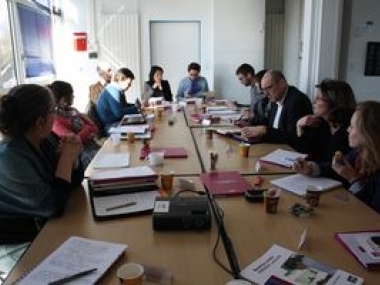First meeting of ULSG in Nantes 20th February
Edited on
10 February 2015The first meeting of Group Local Nantais (ULSG) was held on the 20th of February 2013 and was attended by representatives of the municipality of Nantes, association representatives, a parent, representatives of state agencies and the local/regional representative of the European Funds (17 participants - 2 sub-groups - 2 hours at “ Maison des habitants et du citoyen de Bellevue ”).

The objective of this first ULSG was to reflect on the process of fighting against early school leave at the local level and the parent’s role in this process. One of the main problems discussed was their implication in the prevention of early school leave.
Reflection on parental involvement has raised a set of questions mainly linked to the value of involving parents, to mobilise them or to identify meeting places for parents and other educative players.
• What is the value of contacting the parents? What should be their place in the process? How can educative agents be positioned in this process?
• How to contact parents? How to mobilise parents? What are the most appropriate venues to meet: at the parents’ home, in public space, in local school or other district’s venue ?
• What is the message to pass on during this phase while contacting parents? How to mobilise them long term?
Those questions raised a set of key concepts that seemed important to define together to better understand and reflect on this problematic.
• Empowerment: parent’s involvement and role in the process of fighting against early school leave
• Co-education: mobilise different stakeholders in education – recognition and valorisation of the parents (and of the child) – creation of partnerships (innovation) – stakeholders
• Address: the message addressed to parents must be positive
• Go forward: identification of possible meeting places
• Best practices: which definition?
• Urban / rural: rural living and go to school in urban areas
Finally, based on parent’s testimonials and shared stories from associative actions, thinking was then conducted on how to set up resources to involve parents in this process.
• Identify individuals dropping out: liaise the various stakeholders (co-education) – share information
• To involve parents from the beginning of the process: meet everyone’s expectations as each stakeholder has a part of the solution (co-education)
→ “Café des parents” concept proposed by AFEV (Association de la Fondation Etudiante pour la Ville) opens a discussion space outside the educational institutions on a theme of reflection
→ “ Club des découvreurs ” concept proposed by NAP (Nantes Action Périscolaire)
→ Bring parents in the association’s management committees (concept proposed by NAP)
• Have recourse to the common law: use what already exists as we too often tend to turn back to the exception forgetting what already exists
• Share information: list the multitude of actions offered by community centers and recreation centers from ACCOORD – little known actions because at the district level and /or because actioned for a limited number of families
• Listen: build up a common language to be shared by everyone (parent/child…)
• Promote the Go forward/Go to (institution to parents) – mutual respect (parents/professional institutions)
→ Workshops “family” proposed by AFEV aim at introducing the student status during peak moments (in the local community center or at the parents’ home).
Submitted by admin on




